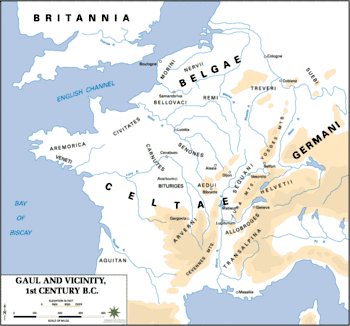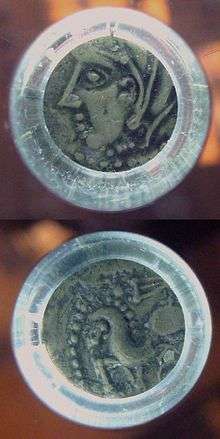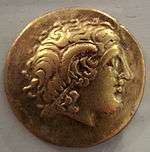Bituriges Cubi
The Bituriges Cubi were a Gallic tribe dwelling around their oppidum Avaricum (modern Bourges). Their territory corresponds to the former province of Berry.


Name
They are mentioned as Bituriges by Caesar (mid-1st c. BC),[1] as Bitoúriges oi̔ Kou͂boi (Βιτούριγες οἱ Κοῦβοι) and Koúbois Bitoúrixi (Κούβοις Βιτούριξι) by Strabo (early 1st c. AD),[2] as Bituriges ... qui Cubi appellantur by Pliny (1st c. AD),[3] and as Bitoúriges oi̔ Kou͂boi (Βιτούριγες οἱ Κοῦβοι) by Ptolemy (2nd c. AD).[4][5]
The name Bituriges means 'kings of the world', stemming from the Gaulish root bitu- ('world') attached to riges ('kings'; sing. rix).[6][7]
The city of Bourges, attested as civitas Biturigum ca. 400 CE ('civitas of the Bituriges', Bituricas in 844, Bituris in 1182), and the region of Berry, attested as pagus Biturigus in 860 ('pagus of the Bituriges'), are named after the Gallic tribe.[8]
History
Early in the 1st century BCE, they had been one of the main Gallic tribes, especially in terms of druids and their political influence. But they soon declined in power as the druids were an important target for Julius Caesar in his conquest of Gaul. What is more, the fact that Avaricum (Bourges) was the only Celtic city that Vercingetorix did not burn, contrary to his scorched earth strategy, upon the approach of Caesar's legions is another proof of the political importance of the Bituriges. Eventually, the town was to be buried by the Roman legions.
Besides Avaricum or Mediolanum (Châteaumeillant) on the road from Paris and Orléans to Arvernum (Clermont-Ferrand), Argentomagus (Saint-Marcel near today's Argenton-sur-Creuse), Déols (vicus Dolensi or Dolus in the 6th c.) or Levroux on the road from Toulouse to Paris were other oppidums of the Bituriges.
This is one of several tribes which seem to have split, with the Bituriges Cubi lived near Bourges/Berry and the Bituriges Vivisci near Burdigala (Bordeaux).
They joined Bellovesus' migrations towards Italy, together with the Aedui, Ambarri, Arverni, Aulerci, Carnutes and Senones.[9]
Motto
A passage from Livy, (Ab Urbe condita V, XXXIV), "summa imperii penes Biturges", meaning "all the power in the hands of the Bituriges", has become the motto of the city of Bourges.
See also
- List of peoples of Gaul
- Saint-Benoît-du-Sault
References
- Caesar. Commentarii de Bello Gallico, 7:5:5
- Strabo. Geōgraphiká, 4:2:2.
- Pliny. Naturalis Historia, 4:109
- Ptolemy. Geōgraphikḕ Hyphḗgēsis, 2:7:10
- Falileyev 2010, p. entry 3049.
- Lambert 1994, p. 36.
- Delamarre 2003, p. 76.
- Nègre 1990, p. 152.
- Livius, Ab Urbe condita 5.34-35.3.
Bibliography
- Delamarre, Xavier (2003). Dictionnaire de la langue gauloise: Une approche linguistique du vieux-celtique continental (in French). Errance. ISBN 9782877723695.CS1 maint: ref=harv (link)
- Falileyev, Alexander (2010). Dictionary of Continental Celtic Place-names: A Celtic Companion to the Barrington Atlas of the Greek and Roman World. CMCS. ISBN 978-0955718236.
- Lambert, Pierre-Yves (1994). La langue gauloise: description linguistique, commentaire d'inscriptions choisies (in French). Errance. ISBN 978-2-87772-089-2.CS1 maint: ref=harv (link)
- Nègre, Ernest (1990). Toponymie générale de la France (in French). Librairie Droz. ISBN 978-2-600-02883-7.CS1 maint: ref=harv (link)
